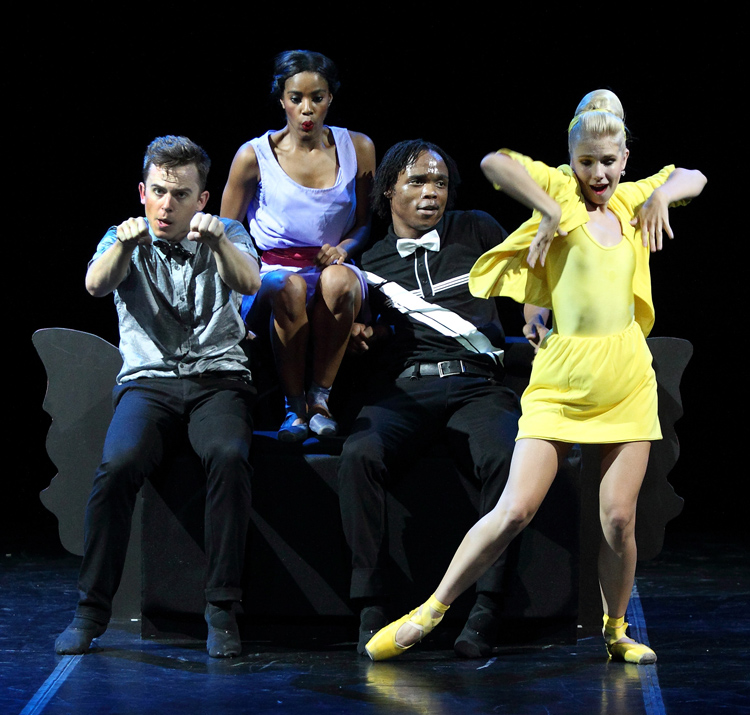When you watch a ballet, it's impossible to imagine how the dancers make the difficult moves look effortless and elegant.

Simoné Botha, one of the talented performers who will be featured in Sean Bovim’s Queen at the Ballet, and who performed the lead role in Bovim Ballet’s Private Presley, has an even tougher job than most: she is hearing impaired.
The ambitious former Miss Deaf SA speaks about what it takes to succeed in the face of adversity.
You started dancing at a very young age. How did this come about?
I just couldn’t sit still on my mom’s lap when I watched my older sister enjoy her ballet classes. My whole soul and body wanted to be on that dance floor. I wanted to try the movements – so I would get off my mom’s lap and dance in the corner when I thought no one was looking. My ballet teacher, Natalie Swanepoel, noticed this and let me join the older children of four, even though I was just two and a half.
As a child, were you aware that the hobby you had chosen would be a challenge for you?
I never saw the physical dancing part as a challenge. Certain aspects regarding music have always been the difficulty. I was privileged to have a supportive teacher who knew how to make ballet as enjoyable for me as any hearing child. I still have problems knowing when to start a dance, but Natalie has often mentioned that my sister and I are two of the most musical children she has ever taught. People always ask how it is possible for a hearing-impaired dancer to be so musical and my answer is always the same: music is not necessarily heard, but rather felt with the heart.
When I started thinking of dance as a career I realised challenges with regards to the music would lie ahead.
Do you feel that you have had to work harder to prove yourself?
Yes. Being a dancer means that you have to constantly prove yourself to choreographers and dance companies. Your best is never enough as there is always somebody who is better than you.
I chose a very challenging career to take on as a hearing-impaired person. You have to be quick on your feet, and must try to be two steps ahead of the game. I miss most of what is being said in class, but thanks to my fellow dancers, my alertness and my quick response to body language, I can usually easily pick up what it is that the teacher or choreographer requires from me.
How do you keep time without being able to rely solely on musical cues?
I look for non-verbal cues. I am always highly aware of my spatial surroundings in dance class, as well as during rehearsals.
I try to make sure that I am in time with the other dancers. They are my musical instruments and I adapt to the rhythm that they provide me.

Former Miss Deaf SA, Simoné Botha, will perform in Sean Bovim’s ‘Queen at the Ballet’. Pictures: Supplied.
What has been the greatest challenge that you have faced?
When I was a child, it was to make people believe that I am able to fit into society and do the things that they are able to do.
I enrolled in drama lessons to improve my speech; piano lessons to help me with learning to try to listen to music and to get a feel for rhythm; ballet to give me more confidence; and modelling to improve my command of the English language, as Afrikaans is my home language.
Today, I cope quite well in normal society, which has its own problems.
Most people have a hard time believing that I have a profound hearing loss. They often say I speak too well, look overly confident and do not seem to have a hard time understanding people when they speak.
It is a compliment, as it shows that hard works pays off, but people often tend to forget that I am deaf and that I do not hear when my back is turned to them.
As a result I may miss an important note or correction or frustrate someone when I ask for repetition of a remark already made.
I really have to concentrate very hard every day. For example, if somebody is calling me, I first have to search for the direction of the caller before being able to focus on the sound and make it out for what it is.
My fellow dancers in Bovim Ballet understand the challenges I face and are very supportive.
What would your message be to hearing-impaired kids who have big dreams but don’t think they can achieve them?
Don’t let small-minded people convince you that your dreams are too big.
Be realistic: someone is bound to tell you at some stage that you are not capable and that your disability will never allow you to succeed.
Do not let them get to you, but rather hold on to those who do believe in who you are. Ask them to help or guide you.
Do not be afraid to fail – and when you do, just know that tomorrow is another day to try yet again.
Support Local Journalism
Add The Citizen as a Preferred Source on Google and follow us on Google News to see more of our trusted reporting in Google News and Top Stories.








